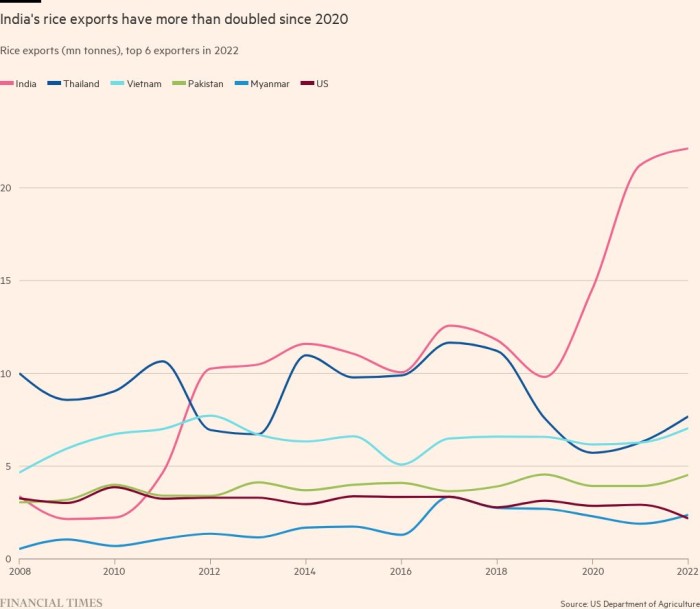Receive free Global Economy updates
We’ll send you a myFT Daily Digest email rounding up the latest Global Economy news every morning.
Good morning. On a visit to Beijing, France’s finance minister Bruno Le Maire has said new French automotive subsidies are “paving the way” for Europe’s car industry to withstand the threat of an influx of cheaper Chinese electric vehicle imports.
Under a package of measures outlined in May to support green industries, the French government will only pay subsidies for new electric vehicles based on the emissions of their producers. That will hit manufacturers from China, where the industry relies on electricity largely powered by coal.
European manufacturers are alarmed by Chinese advances in EVs, with the country taking the lead in battery production and its carmakers outselling western rivals in China’s domestic market.
But Le Maire said he was “not concerned” about the threat to Europe’s carmakers from Chinese electric vehicle imports.
“I think with our new legislative decisions, we pave the way in Europe for a less naive approach, taking into account the level of emissions of the industry,” he said. Read the full story.
-
Related: The head of Europe’s largest car parts supplier Bosch has urged European governments to spend more time improving the competitiveness of the EU instead of focusing on the risks companies face doing business in China.
Here’s what else I’m keeping tabs on today:
-
Economic data: The EU publishes second-quarter growth and monthly inflation figures. The eurozone is expected to return to slight growth in the second quarter, while inflation among its members is set to keep falling in July.
-
Results: First-quarter earnings reports are due from Mizuho Financial Group, Panasonic and Sumitomo Mitsui Financial Group.
Five more top stories
1. Two skyscrapers in Moscow’s premier business district have been damaged by drone strikes that sparked a fireball and left charred holes in the side of the buildings. Sunday’s attack marks at least the fifth time that unmanned aerial vehicles have reached Moscow since May. There was no immediate claim of responsibility from Ukraine.
2. Blackstone’s $68bn flagship property fund has gone from being one of the world’s biggest buyers of property to a large seller, as it raises liquidity to meet redemptions and invest billions in data centres to feed the artificial intelligence boom. Here are more details from an FT analysis of Blackstone’s securities filings.
3. French mining group Eramet has blamed a lack of EU funding for critical minerals for having pushed it into a deepening partnership with China’s Tsingshan, the world’s largest stainless steel producer, which was behind the nickel market blow-up last year. Here’s what the company told the FT about its partnership with the controversial Chinese group.
4. A fundraising vehicle for Donald Trump’s presidential campaign spent more than $40mn on legal costs in the first half of the year, campaign finance filings are expected to show on Monday. News of the hefty legal bill comes as Trump’s team braces for more criminal charges against the former president.
5. McKinsey chief Bob Sternfels has signalled he plans to run for a second term as managing partner as he rebuilds the consultancy after years of reputational crises and as the firm battles mounting economic and geopolitical challenges. Big US consultancies have come under huge pressure in China amid Beijing’s national security raids, but Sternfels said he remained committed to operating in the country.
The Big Read
The planned NeuConnect electricity cable will enable the UK and Germany to trade electricity directly for the first time, helping the two G7 economies phase out fossil fuels. But problems acquiring cables have delayed the £2.4bn project — and others like it — as the demand for the infrastructure outstrips supply. The shortages raise the question: will there be enough cables for the clean energy transition?
We’re also reading . . .
-
War in Ukraine: A new mobilisation law reveals that Vladimir Putin is preparing for an even bigger war in Ukraine.
-
Working from home: From return to office demands to productivity levels, a lot of what we think we know about remote work is wrong, writes Pilita Clark.
-
AI: The fact that giants such as Microsoft and Alphabet are dominating another wave of tech innovation points to deep dysfunction in the system, writes Ruchir Sharma.
Chart of the day
Many countries depend on India, the world’s largest rice exporter, for shipments of the staple. But amid rising food prices in India, prime minister Narendra Modi’s government recently banned exports of several rice varieties, sending shocks around the globe.
Take a break from the news
Last week, a respected former US intelligence official told a congressional committee that, in effect, aliens exist. In this captivating essay, the FT’s Henry Mance looks at the evidence and asks: is it now OK to think seriously about aliens?




Comments are closed, but trackbacks and pingbacks are open.